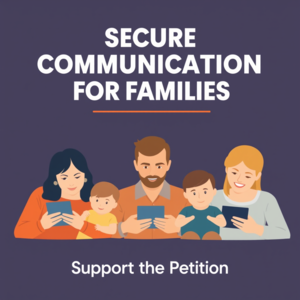50 signatures reached
To: The Minister of Corrections, the Department of Corrections, and the Ministry of Justice
No More Risk, Safe Ways For Families To Stay In Touch

We call on the Minister of Corrections, Department of Corrections, and Ministry of Justice to investigate and implement a secure, monitored electronic communication system for people in custody and their whānau. This system must allow families to stay connected safely without giving out personal addresses and include a child-focused option so tamariki can maintain meaningful contact with their parent. Families and children deserve safe, consistent communication, now is the time to make it happen.
Why is this important?
We want a New Zealand where families of people in custody can stay connected safely, without fear, and where tamariki (children) continue to have meaningful contact with their parents. A world where incarceration does not unnecessarily harm children or whānau, and where rehabilitation is supported by strong family bonds.
Currently, families often must provide their personal residential addresses to maintain contact with loved ones in prison. This creates significant safety and privacy risks, especially for caregivers and children. Many families are reluctant to communicate regularly because of these risks, leaving children isolated from their parent, and weakening family support structures that are proven to help reduce reoffending.
This situation disproportionately affects vulnerable families, creating inequity and stress. For children, inconsistent or unsafe contact with a parent can have lasting emotional and social impacts, including anxiety, disrupted attachment, and increased risk of poor outcomes in education and wellbeing.
Research consistently shows that maintaining strong family connections during incarceration:
- Reduces recidivism: children and families can be a protective factor supporting rehabilitation.[1]
- Supports tamariki wellbeing: consistent contact with a parent fosters emotional stability and resilience.[2,3]
- Promotes fairness and equity: no family should have to risk safety to stay in touch.
Currently, the lack of a secure, monitored communication platform prevents New Zealand from realizing these benefits. Families must choose between safety and contact, an impossible choice that can harm both parent and child.
Implementing a secure electronic communication system:
- Allows families to communicate safely without sharing private addresses.
- Provides a child-focused option, letting tamariki exchange messages, drawings, or school updates safely.
- Supports rehabilitation for people in custody by strengthening family bonds.
- Reduces stress and safety risks for caregivers, improving overall family wellbeing.
This issue needs to be addressed NOW because children are currently missing out on consistent contact with their parents, and families continue to face unnecessary risk. Modern secure communication systems exist internationally and could be adapted for Aotearoa, making this solution both feasible and timely.[4]
References & Supporting Facts:
[1] Reducing Re-offending (Corrections NZ): https://www.corrections.govt.nz/resources/strategic_reports/corrections_strategic_plans/creating_lasting_change_2011_-_2016_YR3/reducing_re-offending
[2] Murray, J., & Murray, L. (2010). Parental incarceration, attachment and child outcomes.https://www.tandfonline.com/doi/abs/10.1080/14751790903416889
[3] Bowlby, J. (1988). A Secure Base: Parent-Child Attachment and Healthy Human Development.https://www.increaseproject.eu/images/DOWNLOADS/IO2/HU/CURR_M4-A13_Bowlby_(EN-only)_20170920_HU_final.pdf
[4]Secure Video Calls with Prisoners -
GOV.UK: https://www.gov.uk/guidance/visit-a-prisoner-using-a-video-call
GOV.UK: https://www.gov.uk/guidance/visit-a-prisoner-using-a-video-call

